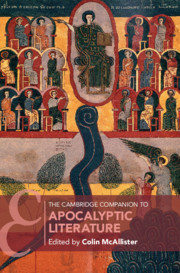Book contents
- The Cambridge Companion to Apocalyptic Literature
- Cambridge Companions to Religion
- The Cambridge Companion to Apocalyptic Literature
- Copyright page
- Dedication
- Contents
- Figures
- Contributors
- Acknowledgements
- Abbreviations
- 1 Through a Glass Darkly: Time, the End, and the Essence of Apocalyptica
- 2 Apocalypticism as a Worldview in Ancient Judaism and Christianity
- 3 Introduction to the Book of Revelation
- 4 The Gnostic Apocalypses
- 5 Exegeting the Apocalypse with the Donatist Communion
- 6 Tests of Faith, Rebirth out of Corruption, or Endless Cycles of Regeneration: Experiments in the Restoration of the Late Roman Empire
- 7 Latin Reception of the Apocalypse in the Early Middle Ages
- 8 Exegesis of the Apocalypse in the Tenth Century
- 9 The End of the World at the Ends of the Earth: Apocalyptic Thought in Medieval Ireland
- 10 Byzantine Apocalyptic Literature
- 11 Joachim of Fiore and the Apocalyptic Revival of the Twelfth Century
- 12 Apocalyptic Sensibility in Renaissance Europe
- 13 “Pride & Vanity of the Imagination, That Disdains to Follow This World’s Fashion”: Apocalypticism in the Age of Reason
- 14 The Formation of Antichrist in Medieval Western Christian Thought
- 15 From Dabiq to Jerusalem: Trajectories of Contemporary Salafi-jihadi Apocalypticism
- 16 American Evangelicals and the Apocalypse
- 17 Apocalypticism in the Contemporary World
- Appendix: Early Medieval Commentaries on the Apocalypse
- Index
- Series page
- References
12 - Apocalyptic Sensibility in Renaissance Europe
Published online by Cambridge University Press: 28 February 2020
- The Cambridge Companion to Apocalyptic Literature
- Cambridge Companions to Religion
- The Cambridge Companion to Apocalyptic Literature
- Copyright page
- Dedication
- Contents
- Figures
- Contributors
- Acknowledgements
- Abbreviations
- 1 Through a Glass Darkly: Time, the End, and the Essence of Apocalyptica
- 2 Apocalypticism as a Worldview in Ancient Judaism and Christianity
- 3 Introduction to the Book of Revelation
- 4 The Gnostic Apocalypses
- 5 Exegeting the Apocalypse with the Donatist Communion
- 6 Tests of Faith, Rebirth out of Corruption, or Endless Cycles of Regeneration: Experiments in the Restoration of the Late Roman Empire
- 7 Latin Reception of the Apocalypse in the Early Middle Ages
- 8 Exegesis of the Apocalypse in the Tenth Century
- 9 The End of the World at the Ends of the Earth: Apocalyptic Thought in Medieval Ireland
- 10 Byzantine Apocalyptic Literature
- 11 Joachim of Fiore and the Apocalyptic Revival of the Twelfth Century
- 12 Apocalyptic Sensibility in Renaissance Europe
- 13 “Pride & Vanity of the Imagination, That Disdains to Follow This World’s Fashion”: Apocalypticism in the Age of Reason
- 14 The Formation of Antichrist in Medieval Western Christian Thought
- 15 From Dabiq to Jerusalem: Trajectories of Contemporary Salafi-jihadi Apocalypticism
- 16 American Evangelicals and the Apocalypse
- 17 Apocalypticism in the Contemporary World
- Appendix: Early Medieval Commentaries on the Apocalypse
- Index
- Series page
- References
Summary
This chapter examines the role of apocalyptic thought during the Renaissance, which was marked by both continuity with medieval apocalypticism and innovation. It includes consideration of its impact on sober humanist scholarship, fierce Reformation debates regarding the papacy, apocalyptic optimism associated with exploration and missionary expansion in the New World, and esoteric speculation about the figure of Enoch.
- Type
- Chapter
- Information
- The Cambridge Companion to Apocalyptic Literature , pp. 212 - 230Publisher: Cambridge University PressPrint publication year: 2020
References
Selected Further Reading
- 1
- Cited by

